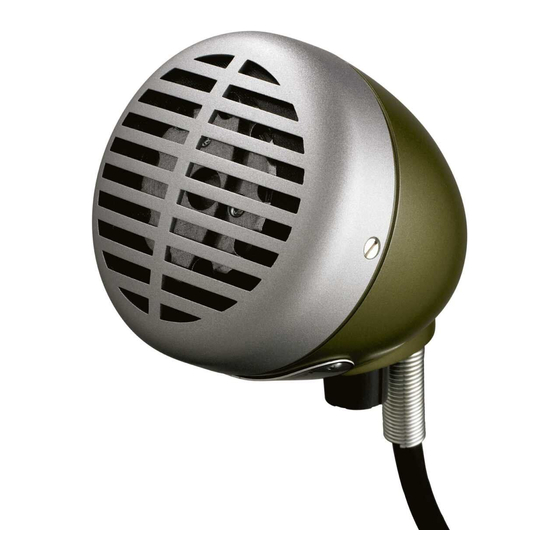Tabla de contenido
Publicidad
Idiomas disponibles
Idiomas disponibles
Enlaces rápidos
GENERAL
Contoured to fit comfortably in the palm of your hand,
the Model 520DX "Green Bullet" microphone produces the
unique sound that has made it a legend among harmonica
players.
The 520DX features a volume control knob at the base
of the microphone (see Figure 1) that allows musicians to
make adjustments to suit their needs during a live perfor-
mance. An attached cable with a standard 1/4-inch phone
plug allows the microphone to be connected to a high-imped-
ance device.
APPLICATIONS
Connect the 520DX directly into a guitar amplifier to
produce the classic blues harp sound. Use the following
guidelines:
The volume control on the microphone should be turned
down before pluging it into an amplifier. As you move
away from the amplifier, the volume can be turned up.
Adjust the microphone's volume control knob during
performances as needed. For example, when switching
from playing rhythm to lead or to place the microphone
on standby between sets.
To avoid feedback, maintain as much distance as pos-
sible from monitors or loudspeakers. Adjust the volume
of monitors or loudspeakers at the mixing console so
that no feedback is present when the volume control
knob on the harmonica microphone is at its maximum
setting.
1997, Shure Brothers Incorporated
27A2929 (QE)
English: Print 1-2
Shure Brothers Incorporated
222 Hartrey Avenue
Evanston IL 60202-3696 U.S.A.
520DX Harmonica Microphone ("Green Bullet")
User's Guide
NOTE: The volume setting of the guitar amplifier may have
a significant effect on the overall tone produced. Experiment
with different microphone and amplifier volume settings to
achieve the desired effect.
VOLUME CONTROL
VOLUME CONTROL KNOB
LOW IMPEDANCE
To connect the 520DX to a low impedance device, such
as a mixer, use a low-to-high impedance-matching line
transformer, such as the Shure model A95U.
NOTE: The 520DX can be rewired for low impedance, but
this disables the volume control. Contact the Shure Applica-
tions Group at (847) 866-2525 for more information.
SPECIFICATIONS
Type
Dynamic
Frequency Response
100 to 5,000 Hz (Figure 2)
TYPICAL FREQUENCY RESPONSE
OFF
FIGURE 1
FIGURE 2
Printed in U.S.A.
Publicidad
Tabla de contenido

Resumen de contenidos para Shure Green Bullet
- Página 1 LOW IMPEDANCE Contoured to fit comfortably in the palm of your hand, the Model 520DX “Green Bullet” microphone produces the To connect the 520DX to a low impedance device, such unique sound that has made it a legend among harmonica as a mixer, use a low-to-high impedance-matching line players.
- Página 2 GÉNÉRALITÉS High, unbalanced Profilé pour s’adapter confortablement à la paume de Load Impedance Range la main, le microphone modèle 520DX «Green Bullet» pro- Minimum: 100 kΩ cure la sonorité unique qui en a fait une légende parmi les harmonicistes. Output Level (at 1,000 Hz) Le 520DX est pourvu d’un bouton de volume à...
-
Página 3: Courbe De Réponse Typique Figure
Contacter le groupe d’applications Shure au (847) 866–2525 BLINDAGE est le retour audio et la masse du boîtier. pour plus de détails. Le microphone modèle 520DX Green Bullet est fourni CARACTÉRISTIQUES câblé pour le fonctionnement en haute impédance, asymé- Type trique avec jack téléphone de 1/4 po (Figure 3). -
Página 4: Regelung Des Lautstärkepegels
VERWENDUNGSMÖGLICHKEITEN neu verdrahtet werden; dadurch wird jedoch die Lautstärke- pegelregelung deaktiviert. Weitere Informationen erhalten Sie von der Shure Applications Group unter der Telefonnum- Zur Erzeugung des klassischen Bluesharmonika- mer ++1 (847) 866–2525. klangs wird das 520DX direkt an einen Gitarrenverstärker TECHNISCHE DATEN angeschlossen. - Página 5 Mikrofonausgangs–Klinkensteckers GENERALIDADES Diseñado para reposar cómodamente en la palma de la mano, el micrófono 520DX “Green Bullet” produce ese so- Kabel nido distintivo que lo ha convertido en leyenda entre los que 6,1 m (20 ft) langes zweipoliges, abgeschirmtes Kabel tocan armónica.
-
Página 6: Especificaciones
Comu- pedancia; el BLINDAJE es el conductor de retorno de audio níquese con el Grupo de Aplicaciones Shure al teléfono y la conexión a tierra. (847) 866–2525 (en los EE.UU.) para más información. -
Página 7: Dati Tecnici
Per informazioni ulteriori, rivolgersi allo Di forma appositamente realizzata per stare comoda- Shure Applications Group al numero USA (847) 866–2525. mente nel palmo della mano, il microfono ”Green Bullet” mo- DATI TECNICI dello 520DX produce quel suono esclusivo che lo ha reso leggendario tra i suonatori di armonica. -
Página 8: Componenti Di Ricambio
Manopola di regolazione volume ..95A2073 Il microfono Green Bullet modello 520DX è fornito ca- Potenziometro di regolazione volume ..90A4487 blato per il funzionamento sbilanciato ad alta impedenza, Per informazioni ulteriori di assistenza o sulle parti di ri- con spina fono da 1/4”...








